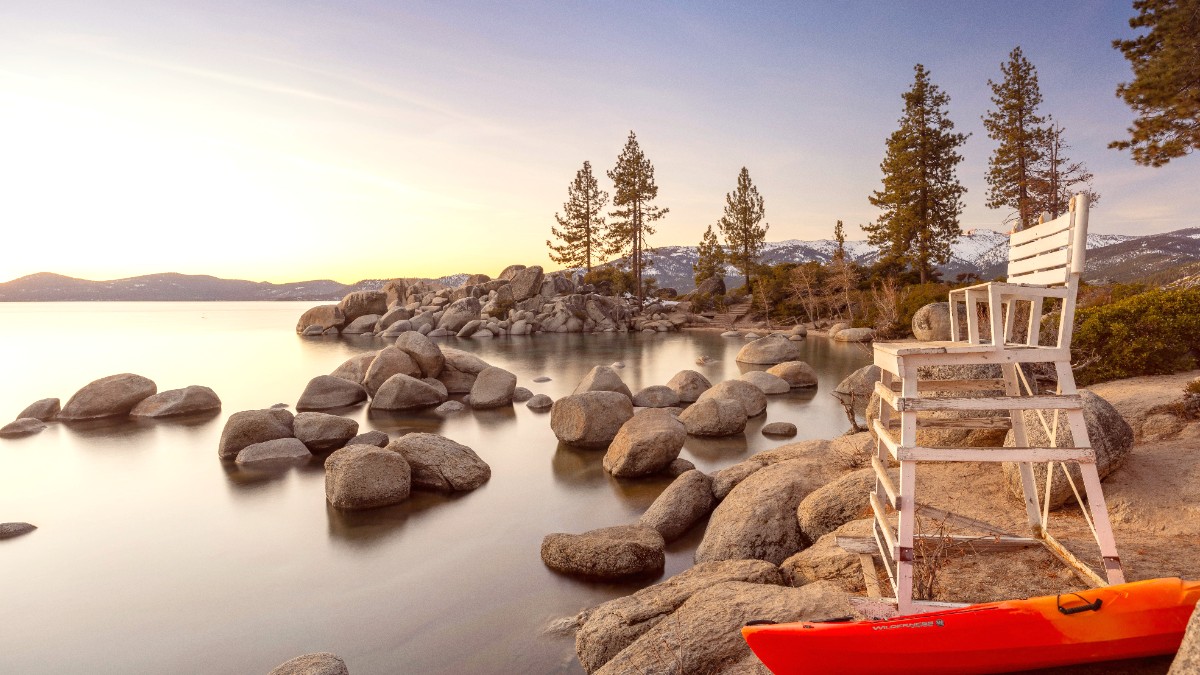
Nevada, USA
Many groups work to protect Lake Tahoe. The Lake Tahoe Basin Management Unit (U.S. Forest Service) manages federal lands, with focus on watershed protection, forest health, and recreation. California and Nevada State Parks protect significant portions of the shoreline and surrounding natural areas.
Help reduce waste during your visit. Recycling bins are available at most accommodations, public parks, and designated drop-off sites for plastics, glass, and aluminum. Follow local recycling guidelines. Pack a Reusable water bottle and Reusable shopping bag.
While Lake Tahoe itself is vast, the surrounding region is part of a generally arid climate. Water conservation is important. Use water responsibly in accommodations, take shorter showers, and turn off taps when not in use.
Choose businesses that prioritize sustainability and minimize your footprint.
Look for accommodations with "green" certifications or those that explicitly state their environmental practices. Linen reuse programs, energy efficiency, and waste reduction.
Consider purchasing carbon offsets for your flights and car travel through reputable organizations. This mitigates the environmental impact of your journey.
This is required for all outdoor activities. Do not leave any trash behind.
Make conscious choices for your travel products and experiences.
Lake Tahoe Basin Management Unit (U.S. Forest Service) manages federal lands. California and Nevada State Parks protect portions of the shoreline and natural areas.
Many organizations actively work on conservation, including the League to Save Lake Tahoe ("Keep Tahoe Blue") and the Tahoe Fund.
The Tahoe Regional Planning Agency (TRPA) preserves Lake Tahoe's environment. Non-profits like the League to Save Lake Tahoe ("Keep Tahoe Blue") and the Tahoe Fund actively work on conservation.
Show respect for the local culture and residents.
Support the region's heritage. Support museums and historical sites that preserve the region's history.
Politeness goes a long way. Be polite and courteous in interactions with locals. Be mindful of noise levels, especially in residential areas.
Ask before you click. Always ask permission before taking photos of individuals, especially children. Respect private property boundaries.
Behave respectfully in places of worship. Not broadly applicable to Lake Tahoe tourism, but generally, be respectful and dress appropriately if visiting local churches.
Support the local economy and community during your visit.
Supporting local businesses directly benefits the Tahoe community.
Seek out locally owned shops, artisan crafts, and businesses that source ethically.
Dine at local restaurants, shop at independent boutiques, and book tours with local operators.
Support local businesses directly. Dine at local restaurants, shop at independent boutiques, and book tours with local operators when possible. This keeps money within the community.
Your spending directly helps the community flourish.
Be aware of any negative impacts. Avoid activities that exploit local resources, wildlife, or people.
Donate to worthy causes. If you wish to contribute, consider donating to local environmental conservation organizations.
While not formal "community-based tourism" as found in some developing countries, supporting local businesses directly benefits the Tahoe community.
Make conscious purchasing decisions. Seek out locally owned shops, artisan crafts, and businesses that source ethically. This ensures fair wages and sustainable practices.
Be aware of any negative impacts. Avoid activities that exploit local resources, wildlife, or people. This is generally not a significant issue for tourists in Lake Tahoe, but awareness is always important.
Your spending directly helps the community. Dine at local restaurants, shop at independent boutiques, and book tours with local operators when possible. This keeps money within the community.